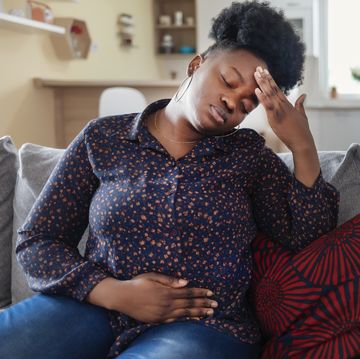If there’s one thing we’re embarrassed to talk about, it’s what goes down in the bathroom... especially blood in stool. If we could, we’d totally hold up the charade that ladies don’t poop at all.
So when something is off—like noticing blood in your stool—the poo taboo can make you want to ignore it.
But not talking about it could be dangerous when it comes to your health. That’s because your poop is a window into what’s going on in your gut, says Niket Sonpal, M.D., a gastroenterologist and clinical professor of medicine in New York City.
RELATED: Turns Out, We’ve All Been Pooping the Wrong Way Our Entire Lives
Find out what you need to do the next time you go to the doctor:
Just keep this in mind: Noticing blood on your toilet paper or in the toilet after you go could be caused by a variety of different things—and heading directly to a medical professional is always the best way to find out what's what. That being said, Sonpal says some causes are more likely (and less scary) than others for blood in stool.
The color of the blood can give you a clue as to where the underlying issue might be. Darker, almost blackish blood typically comes from the upper GI tract (your stomach or esophagus), which could mean you have an ulcer.
Ulcers are fairly common—about 10 percent of people will develop one at some point in their lives. For the majority of cases, treatment is relatively simple. Taking the right medication, reducing stress, cutting out alcohol, and nixing smoking can all help them heal.
RELATED: Holding in Your Poop for Too Long Can Actually Be Deadly
Meanwhile, “seeing bright red or maroon colored blood is most commonly from a lower GI tract source, meaning the small intestine or colon,” says Sonpal. Hemmorhoids commonly cause bright red blood on toilet paper or in the bowl. “Hemorrhoids are scary because they bleed a lot,” says Sonpal, who suggests fiber-friendly dietary changes as a way to prevent developing them in the first place. Another common cause of bright red blood in stool could be an anal fissure, a tear that can be caused by anything from constipation to childbirth.
However, Sonpal stresses that you should never assume your bleeding is just a hemorrhoid and that you should see your doc for an official diagnosis (don’t be shy—we swear, they’ve seen everything!).
In some instances, blood in your stool could mean colorectal cancer. It’s important to note, though, that the amount of blood is often unnoticeable to the regular eye—so the rule of thumb is prevention, prevention, prevention. If you have a history of GI cancers in your family, Sonpal suggests starting regular colonoscopies earlier than the recommended age of 50.
RELATED: 4 Signs That Your Constipation Warrants a Trip to the ER
“The bottom line is, blood in stool is never considered normal,” says Sonpal. So if you notice anything out of the ordinary, get your behind to a doctor right away.
--
Macaela MacKenize is a writer, runner, and (aspiring) yogi. Thanks to her inner nerd, she's researched everything from the weirdest health and fitness trends, to the behavioral economics of our love lives, to what happens when we donate our bodies to science. When she's not writing, you might find her singing in a rock 'n roll cover band.
Macaela MacKenzie is a journalist who writes about women and power. She covers women’s equality through the lenses of sports, wellness, and the gender gap across industries and is the author of MONEY, POWER, RESPECT: How Women in Sports Are Shaping the Future of Feminism. Mac was most recently a Senior Editor at Glamour where she directed all health and wellness coverage. Her work has appeared in Elle, Glamour, SELF, Bustle, Marie Claire, Allure, Women's Health, and Forbes among other publications.














